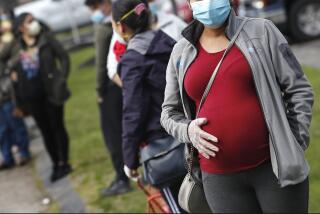Panel Proposes Increased Benefits for Prenatal Care
- Share via
WASHINGTON — A committee of the National Academy of Sciences, calling prenatal care a “dollars-and-sense” issue that could produce substantial savings in medical costs, Tuesday unveiled a proposal to increase prenatal care for an estimated 14.6 million American women who lack private health insurance and Medicaid coverage.
“Our nation has failed to give adequate priority to the principle that all pregnant women--not only the affluent--should receive prenatal, delivery, and post-partum services,” said panel chair Joyce C. Lashof at a news conference announcing the plan.
She and other members of the 10-member panel said that the government must take action to reverse what they said has been a decline in prenatal care in the decade, occurring because too many women cannot afford it.
Call for Improved Benefits
The panel’s findings were based on a two-year study of prenatal care in urban and rural areas around the nation. They were released a day after Surgeon General C. Everett Koop called for new efforts to improve insurance benefits for mothers and children.
Since 1980, the panel said, about a third of all infants born in the United States received little or no prenatal care because their mothers did not have health insurance. Such infants are particularly susceptible to low birth weight, whose complications cause about 40,000 infant deaths each year.
The problem is most severe among minorities, teen-agers and people in inner cities and isolated rural areas. “It covers the entire nation, but it’s in pockets,” said committee member George M. Ryan, a professor of obstetrics and gynecology at the University of Tennessee in Memphis.
Lashof, a professor at UC Berkeley’s School of Public Health, called on states to begin requiring that insurance plans in their jurisdictions offer maternity health benefits. Currently, some small firms do not offer prenatal care in their employee health plans.
The panel also called for increased federal grants for public health clinics and expansion of Medicaid, the federal-state health program for the poor, to provide prenatal care to all pregnant women with incomes up to 185% of the federal poverty level.
More to Read
Sign up for Essential California
The most important California stories and recommendations in your inbox every morning.
You may occasionally receive promotional content from the Los Angeles Times.













